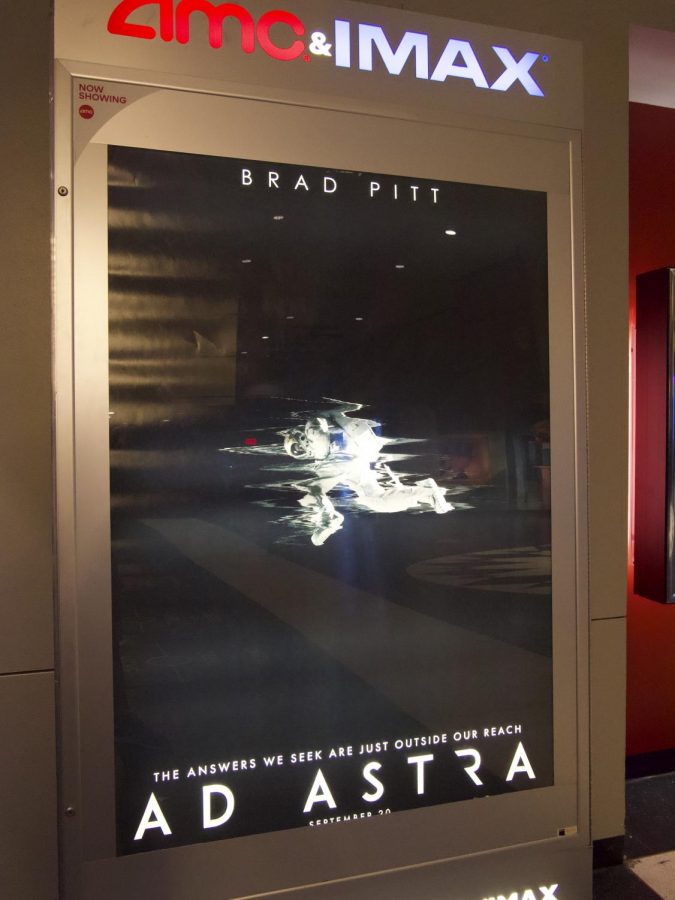Review: “Ad Astra”
Brad Pitt travels into the “Great Beyond” for a story grounded in human emotion
October 2, 2019
“Ad Astra,” marketed as almost a science-fiction epic meets “2001: A Space Odyssey,” tries to have more in common with the latter rather than the former. James Gray (“Little Odessa,” “The Lost City of Z”) didn’t look to spend $80 million on the next “Star Wars,” but rather, the next big space exploration film that is meant to tell a “human story” first, particularly in the same vein as recent films such as Christopher Nolan’s “Interstellar” or even Damien Chazelle’s “First Man” (albeit to a lesser extent, in regard to its presentational realism). It’s a visually stunning tale with a lot to say, though the intended impact of its thematic storytelling is often hard to truly interpret or even appreciate.
Roy McBride (Brad Pitt) is an astronaut who has ultimately lost his enthusiasm and overall passion for making a difference from the stars and beyond. As a result, he has become emotionally distant from the people that surround him, including his colleagues and even his wife Eve (Liv Tyler). This is primarily due to Roy’s upbringing as an adolescent, as his father Clifford McBride (Tommy Lee Jones) left his family to work on the classified “Lima Project” within the far reaches of the solar system. When Roy was only 29, it was reported that Clifford and the other crew members were no longer in contact with U.S. Space Command (“SpaceCom”). Now, decades later, humanity is under attack by a series of cosmic surges that randomly affect various areas of the solar system, including Earth. Roy, after miraculously surviving a surge attack while working on a space antenna, is called in by SpaceCom to help them establish contact once again with Clifford and the Lima Project, as they believe that the surges themselves are emitting from an unstable source of antimatter located on the Lima Project base, whose last known location was near Neptune. Roy hesitatingly accepts the mission, though in reality, he can’t truly figure out whether he’s embarking on this cathartic journey to find his missing father because, as Roy says in the film, “he wants to free him or wants to be free of him.”
And at its core, this theme of “father and son” is essentially the spark that ignites both this story and the sympathy we’re supposed to have for Roy’s motivations. Yet, throughout most of the film, it’s somewhat difficult to connect with Pitt’s character, whether it’s in large part because we only briefly witness Roy’s upbringing for ourselves (practically 90% of it is told through Roy’s narration) or even because Pitt himself, much like the direction given to Ryan Gosling in “First Man,” is being told to act as stoic as possible, while still trying to convey various feelings of repression, melancholy and regret. Even the relationship between him and Eve is only conveyed to the audience through that narration, with only one real scene, depicting Roy viewing a video message that she had sent to him, actually “showing” the distance between them instead of “telling” it.
From a visual standpoint, however, Hoyte van Hoytema’s (“Her,” “Dunkirk,” and coincidentally “Interstellar”) immaculate cinematography immediately transports the viewer into an ambitious realm of celestial space and time, one that chooses to mirror a future where HAL 9000 would easily fit right in. With various shots and uses of mise-en-scène that look as if they were pulled directly out of the works of 1960s Kubrick or even the suspenseful depth of astronomical isolation, as accomplished with Alfonso Cuarón’s direction in “Gravity,” it’s clear that Gray aimed for symbolic immersion (there’s especially a mesmerizing shot of Roy choosing to walk down an orange corridor that eventually turns to black, as seen in the trailer).
Within the final few minutes of the third act, Gray presents a lasting message that, in many respects, provides a seemingly effective conclusion for our central characters. But even with that said, the connection feels anything but effectively genuine, and at the same time, maybe that was the idea. Without going into obvious spoilers, Gray almost seems to associate this message with the entire film’s issue of character investment and sympathy, and if this was indeed his intention, then well-played. But if this came as an unintentional, “well, that solves the problem” type of thematic solution, then so be it.
Still though, there is no denying that what Gray and his co-writer Ethan Gross have crafted here, in regard to a story structure, is something purposefully up to one’s interpretation and subjectivity. As it stands, “Ad Astra” already has a well-established foundation. It’s just whether or not they chose to build upon it remains the question. Though, if nothing else, it still made me think.










